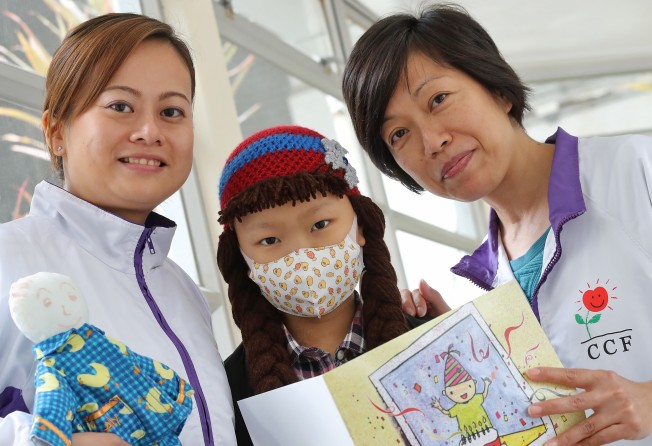Hong Kong specialists form bridge between doctors and young cancer patients
Child Life Service team members help children in hospital express their feelings and needs while overcoming fear and anxiety

Merry, 10, wants to be a baker so that she can always make cakes for her friends and other children.
“I baked cakes with my classmates every week,” she said, recalling her days at her family home in eastern China’s Anhui province.
The little girl, who was born in Hong Kong, left her family and schoolmates to return to the city for medical treatment last year.
She was diagnosed with neuroblastoma, a tumour of the sympathetic nerve tissue. It is the most common solid tumour in children after leukaemia, brain tumours and lymphoma.
Merry has gone through intensive treatment since December 2016, comprising chemotherapy, surgery, radiation therapy and autologous stem cell transplant.
She was discharged from the bone marrow transplant unit at Prince of Wales Hospital in Sha Tin last month, and still needs special attention. She is being cared for by her aunt in Hong Kong.
During her hospital stay, Merry received support from the Child Life Service, provided by the Children’s Cancer Foundation. The foundation is a beneficiary of Operation Santa Claus, the annual fundraising campaign jointly organised by the South China Morning Post and RTHK.
Under the Child Life Service project, a team of specialists helps children with cancer express their feelings and needs. The team also helps these young patients overcome fear and anxiety and maintain their normal development.
Tammy Loy Sze-wah, a professional services manager at the foundation, said children might have difficulty understanding the treatment they receive.
“Child life specialists may turn those messages delivered by doctors into expressions that the young cancer patients can comprehend,” the child life specialist said.
“If you are unhappy with the treatment, we can also communicate your feelings to your doctor so that we can fine-tune things.”
Fellow child life specialist Karen Leung Oi-lam said children liked to talk to others when they felt uncomfortable during their cancer treatment.
She supported Merry throughout her treatment procedures and helped alleviate the little girl’s emotional pain.
Merry knew she was ill, but she sometimes resisted treatment because she thought she had suffered enough, Leung said. “Cancer drugs make her feel nauseated.”
“[Merry] is no longer a small kid. You have to let her express her feelings and listen to her,” the specialist said, stressing the importance of her role as the child’s fellow traveller along the cancer journey.
The Child Life Service is available at six public hospitals. Loy said the foundation was able to continue to hire staff and develop the service with funds from Operation Santa Claus.